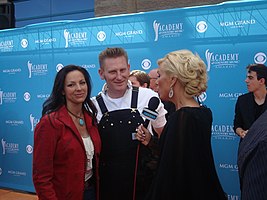Rory Feek
Rory Lee Feek | |
|---|---|
 Rory Lee Feek (center) with Joey Martin Feek (left). | |
| Born | April 25, 1965[1] |
| Occupation | Singer-songwriter |
| Years active | 1996-present (as a songwriter) 2008-2016 (as a singer) |
| Spouse(s) | Joey Martin Feek (m. June 15, 2002 – her death, March 4, 2016) |
| Children | 3 |
| Musical career | |
| Genres | Country |
| Instrument | Vocals |
| Labels | Sugar Hill/Vanguard (in Joey + Rory) |
| Military career | |
| Allegiance | |
| Service | |
| Years of service | 8 years |
Rory Lee Feek (born April 25, 1965) is an American country music singer and songwriter. In his career, he has written singles for Clay Walker, Blake Shelton, Tracy Byrd and other artists. He and his wife, Joey Martin Feek, formed the duo Joey + Rory and was placed third on the first season of the CMT talent show Can You Duet. He also established Giantslayer Records for launching of new independent artists.
Personal life
Rory Lee Feek was born and raised in Atchison, Kansas. In his blog, thislifeIlive, he gives his birth year as 1965, despite numerous other sources that give it as 1966. In 2002, he married Joey Martin Feek, with whom he started the duo Joey + Rory. They have one daughter, Indiana Boon (born February 17, 2014), who was born with Down Syndrome. Feek also has two older daughters, Heidi (born 1986) and Hopie (born 1988),[2] from a previous marriage. Joey died of metastatic cervical cancer on March 4, 2016.
Career
Inspired by Don Williams, Merle Haggard and other artists, Feek began playing guitar at age fifteen. He later served two tours of duty in the United States Marine Corps after high school, before moving to Dallas, Texas, where he played in nightclubs. Feek moved to Nashville, Tennessee in 1995 after being encouraged to by Nashville entertainment attorney Rod Phelps, and signed to a publishing contract. One of his first single releases as a songwriter was Collin Raye's "Someone You Used to Know", a Top Five country hit in 1999. A year later, Clay Walker reached Top Five as well with "The Chain of Love", another song that Feek co-wrote.[3]
Feek continued to write for other artists in the 2000s, including album tracks for Mark Wills, Kenny Chesney, Terri Clark, Randy Travis, and Lorrie Morgan, as well as Tracy Byrd's 2003 single "The Truth About Men".[3] In 2004, Feek achieved his first Number One as a songwriter when Blake Shelton topped the country charts with "Some Beach", which he co-wrote with Paul Overstreet.[4] Also in 2004, Feek founded the Giantslayer Records label, on which Blaine Larsen recorded two studio albums in association with BNA Records.
In 2008, Feek and his wife, Joey Martin Feek, founded a duo called Joey + Rory. They came in third place on the CMT talent show Can You Duet, and later that year signed to a recording contract with Vanguard Records.[5] Joey + Rory released their debut single "Cheater, Cheater" that year, and peaked at No. 30 on the country singles charts with it. That same year, Jimmy Wayne charted on the country charts with "I Will", another Feek co-write.
Singles co-written by Rory Lee Feek
- Catherine Britt – "The Upside of Being Down"
- Tracy Byrd – "The Truth About Men"
- Easton Corbin – "A Little More Country Than That"
- Joey + Rory – "Cheater, Cheater", "Play the Song", "To Say Goodbye", "This Song's for You", "That's Important to Me"
- Blaine Larsen - "How Do You Get That Lonely", "The Best Man"
- The Oak Ridge Boys – "It's Hard to Be Cool (In a Minivan)"
- Collin Raye – "Someone You Used to Know"
- Crystal Shawanda – "You Can Let Go"
- Blake Shelton - "Some Beach"
- Clay Walker – "The Chain of Love"
- Jimmy Wayne – "I Will"
- Mark Wills - "Rich Man"
References
- ^ "This Life I Live". Retrieved 2016-02-04.
- ^ http://www.thislifeilive.com/happymothersdaydad
- ^ a b "Rory Lee Feek biography". Blacktop Music Group. Retrieved February 4, 2009.
- ^ Morris, Edward (February 23, 2005). "Paul Overstreet, Rory Lee Feek Bask on "Some Beach"". CMT. Retrieved February 4, 2009.
- ^ Malec, Jim (October 28, 2008). "Introducing Joey + Rory: "Like Two Names Carved in an Oak Tree"". The 9513. Archived from the original on February 18, 2009. Retrieved February 4, 2009.
